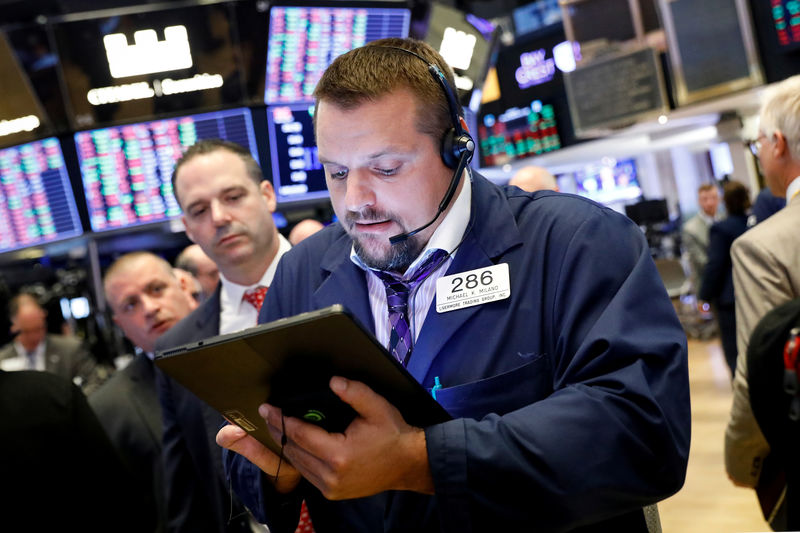By Marc Jones
LONDON (Reuters) - The dollar climbed to a 29-month high on Tuesday as a blizzard of soft global data left the U.S. economy as the only one still looking reasonably healthy.
European stocks (EU) and the euro [FRX/] both suffered shaky mornings, after euro zone manufacturing data showed the sharpest contraction in almost seven years.
Australia's dollar
Emerging markets were also in the firing line. The South African, Turkish, Russian, Indian and Mexican currencies fell 0.3% to 0.8% as the dollar charged to May 2017 highs. (DXY) (N) [EMRG/FRX]
"On we go with the dollar," said Societe Generale (PA:SOGN) strategist Kit Juckes. "It is the pick of the major economies, and I don't think anything is going to change (for the dollar) until the economy slows.
"And if you are sensitive to global trade and sensitive to manufacturing, you are having a very tough time at the moment, there is no doubt about it."
The dollar's advance did slow before U.S. trading and manufacturing data, but economic surprise indices published by Citigroup (NYSE:C) <.CESIUSD> <.CESIEUR> underscored just why it was looking so good.
The U.S. version is currency at its highest in nearly two years, while Europe's has fallen to a 2019 low.
BUMPY BOND MARKETS
Wall Street, which is up almost 20% this year, looked set for another positive start (N), but bond markets were grumbling again.
A weak auction of Japanese government debt after news the Bank of Japan will scale back some of its bond buying this month underscored the lack of enthusiasm for the negative interest rates that more and more countries seem to be heading for.
That fed across to higher bond yields in major markets, with 10-year German, French and Spanish and U.S Treasury yields all up 2 to 4 basis points. [GVD/EUR]
British government bonds also sold off as Prime Minister Boris Johnson pitched new proposals for an amended Brexit agreement that would remove the contested insurance policy for the Irish border.
"We had reached extreme lows (for bond yields) in August, but now the central banks have delivered the easing markets were expecting I think we needed this correction," said Pooja Kumra, a European rates strategist at TD Securities.
HOT CHIPS
In Asia, the world's largest contract chipmaker, TSMC (TW:2330) of Taiwan, jumped 2.9% to a record high.
MSCI's broadest index of Asia-Pacific shares outside Japan (MIAPJ0000PUS) rose 0.23%. Japan's Nikkei (N225) gained 0.6% despite a six-year low in big business confidence. Australia's benchmark (AXJO) rose 0.8%, some of that after the central bank's rate cut.
White House trade adviser Peter Navarro dismissed reports on Monday that President Donald Trump's administration was considering delisting Chinese companies from U.S. stock exchanges as "fake news".
China and the United States are due to resume trade talks next week in Washington.
"Whether it was a fake news or not, it is becoming harder to know exactly what the U.S. administration will be doing," said Takashi Hiroki, chief strategist at Monex Securities.
The World Trade Organization cut its forecast for growth in global trade this year by more than half on Tuesday and said further rounds of tariffs and retaliation, a slowing economy and a disorderly Brexit could squeeze it even more.
Back in the currency market, the euro reached $1.09 after trading as low as $1.0877 (EUR=), near a two-and-a-half-year low.
The yen spent most of the day around 108.25 yen to the dollar
Gold also fell to a two-month low as the stronger dollar took its toll on metals markets. It was last trading at $1,468 per ounce
Oil prices rebounded after data showed production at the world's largest oil producers fell in the third quarter. It also came after an 8% drop over the past few months.
U.S. West Texas Intermediate (WTI) crude (CLc1) rose 0.6% to $54.39 per barrel after falling 3.3% on Monday. Brent (LCOc1) was up 0.8% at $59.70 a barrel.

"Any rallies, though, are likely to be met with plenty of sellers as a slowing global economy and the recovery of Saudi production outweigh any Middle East risk factors for now," said Jeffrey Halley, a senior market analyst for Asia Pacific at OANDA in Singapore.